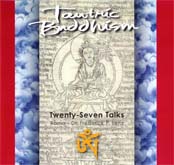
Tantric Buddhism
The Path of Affirmation
Why do we meditate?
Why do we engage in practices? Why bother? Why spend hours sitting by yourself when you could be with convivial companions doing socially acceptable or unacceptable things? Why go off by yourself into a condition of solitude within your own mind, focusing on images, on chakras, on points of light for many hours, day after day, year after year, lifetime after lifetime? Why exclude a lot of experiences from your life that you might enjoy? Why include experiences that perhaps are not initially innate to your energy flow?
That's self-discovery, and self-discovery is a process of exclusion and inclusion. We exclude things that take energy from us, even though they might be enjoyable. We include things that might be difficult because they create energy. Ultimately the energy is enjoyable and the loss of energy is not, needless to say. But, since we all die at the end of a lifetime, is it really better to be an ascetic? It's like, "Wouldn't you really rather have a Buick?" That was an ad slogan some time back.
I don't know. Would I? Somebody out there wanted me to think that I would, and I guess if I heard the jingle enough times maybe I would really want a Buick. I'm not sure. So in the development of one's life, you could just party constantly and if you have a somewhat good constitution and you run a few miles a day, you could probably party hardy for a whole lifetime and die at a ripe, old, well partied-out age and have had a very good time.
On the other hand, you could not do that and lead a life of internal origination where you're meditating - probably die at about the same age, and at the end you die and it's all forgotten. Oh, there's rebirth, of course, and determination where your stateroom is going to be in the next life. Are you going to be in first class? Are you going to be in steerage? Somewhere in between? Or are you even going to get on the boat? Are you going to be working? You know, that sort of thing, on the big cruise of infinity.
OK, but aside from that reincarnation stuff, being pragmatic just about one life, why go through all the - what most people would perceive as trouble - to learn to control your thoughts, your emotions, modify your lifestyle in such a way that might seem unnatural from the point of view of many members of our society? Of course, implicit in that is what they do is what is natural. And if you do what they do, you are natural because whatever they do is somehow godlike. That's the thesis. But I don't know about all that.
Why do this? It's a lot of work! And maybe you're really not going to have a better time than the person who just has a nice family, parties, has a nice life, goes boating on Sundays. Why get involved with self-discovery? Why go through these practices? Why come to meditative sessions with mystical teachers? Why modify your life? You've already developed a lot of habits by the time you meet self-discovery. Most people don't run into self-discovery seriously until they're at least 18. In 18 years you've habituated your entire being to a certain lifestyle and the rest of your life is just an extension of that, primarily. Why change that? It's a lot of work. You've already got the thing going. Why change the direction so radically, which is what's necessary in self-discovery, to different mind fields.
In other words, is it really worth it? Why would a person do that? Why do mystics sit in caves on top of the Himalayas when they could be down where there's central heating and a nice warm couch? What drives people to do these weird religious practices? I can say ecstasy, but what does that mean? You might be able to be very ecstatic with central heating - I tried to join the two preceding sentences with the graph before it and start this graph with the next sentence but couldn't. The reason that one practices self-discovery is because we're seeking a feeling. We're seeking a feeling. And when we feel that feeling, there is nothing like that feeling. It's just a feeling.

